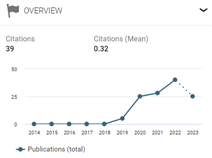Pengetahuan dan sikap ibu hamil dengan pola kepatuhan mengonsumsi tablet tambah darah di Kabupaten Aceh Timur
DOI: 10.30867/gikes.v4i1.247Abstract
Background: Pathological conditions from pregnancy to childbirth in a woman are essential to pay attention to watch out. One of them is anticipating chronic energy deficiency disorders in women. Adherence to the consumption of blood supplement tablets is still constrained due to mothers' low knowledge and attitudes.
Objectives: The study aimed to measure the relationship between the knowledge and attitudes of pregnant women with adherence to taking blood supplement tablets in the East Aceh District.
Methods: The research design was cross-sectional, involving a sample of 41 pregnant women, and was conducted in 2019 in East Aceh. Data collection on knowledge, attitude, and compliance were through direct interview techniques with questionnaire instruments. Data processing starts from editing, coding, entry cleaning, data entry, to tabulation. Data analysis using Chi-square statistical test at 95% CI.
Results: Most pregnant women had good knowledge (58,5%) and attitudes (68,3%) about nutrition, anemia, and consumption of blood supplement tablets. Iron tablet consumption compliance was 70,7%. There was an association between knowledge (p= 0,035; OR= 4,4) and attitude (p= 0,018; OR= 5,4) with adherence to taking blood supplement tablets among pregnant women in East Aceh District.
Conclusion: Good knowledge and attitude are related to the level of compliance of pregnant women in taking blood supplement tablets.
Keywords
Full Text:
PDFReferences
Aceh, P. K. (2016). Profil Kesehatan Aceh Tahun 2016.
Adawiyani, R. (2013). Calyptra: Jurnal Ilmiah Mahasiswa Universitas Surabaya Vol.2 No.2 (2013). 2(2), 1–20.
Aditianti, A., Permanasari, Y., & Julianti, E. D. (2015). Pendampingan Minum Tablet Tambah Darah (TTD) Dapat Meningkatkan Kepatuhan Konsumsi TTD Pada Ibu Hamil Anemia. Penelitian Gizi Dan Makanan (The Journal of Nutrition and Food Research), 38(1), 71–78.
Aktaç, S., Sabuncular, G., Kargin, D., & Gunes, F. E. (2018). Evaluation of nutrition knowledge of pregnant women before and after nutrition education according to sociodemographic characteristics. Ecology of Food and Nutrition, 57(6), 441–455.
Al-Rahmad, A. H., & Fadillah, I. (2017). Perkembangan Psikomotorik Bayi 6–9 Bulan berdasarkan Pemberian ASI Eksklusif. Aceh Nutrition Journal, 1(2), 99–104.
Amir, N., & Djokosujono, K. (2019). Faktor-Faktor yang Berhubungan dengan Konsumsi Tablet Tambah Darah (TTD) pada Remaja Putri di Indonesia: Literatur Review. Jurnal Kedokteran Dan Kesehatan, 15(2), 119–129.
Chapman-Novakofski, K., & Karduck, J. (2005). Improvement in knowledge, social cognitive theory variables, and movement through stages of change after a community-based diabetes education program. Journal of the American Dietetic Association, 105(10), 1613–1616.
Iftode, D. (2019). Generation Z and learning styles. Available at SSRN 3518722.
Kementerian Kesehatan RI. (2018). Laporan Riskesdas 2018. In Laporan Nasional Riskesdas 2018 (Vol. 53, Issue 9, pp. 154–165).
Kholisoh, N. (2018). Pengaruh terpaan informasi vlog di media terhadap sikap guru dan dampaknya terhadap persepsi siswa. Jurnal Aspikom, 3(5), 1002–1014.
Lestari, S., Fujiati, I. I., Keumalasari, D., Daulay, M., Martina, S. J., & Syarifah, S. (2018). The prevalence of anemia in pregnant women and its associated risk factors in North Sumatera, Indonesia. IOP Conference Series: Earth and Environmental Science, 125(1), 12195. https://doi.org/10.1088/1755-1315/125/1/012195
Notoatmodjo, S. (2014). Ilmu perilaku kesehatan. Jakarta: Rineka Cipta.
Purnamasari, G., Margawati, A., & Widjanarko, B. (2016). Pengaruh Faktor Pengetahuan dan Sikap Terhadap Kepatuhan Ibu Hamil dalam Mengkonsumsi Tablet Fe di Puskesmas Bogor Tengah. Jurnal Promosi Kesehatan Indonesia, 11(2), 100–115.
Rahmawati, N., & Nurhajijah, S. H. (2021). Pengetahuan, sikap dan kepatuhan mengkonsumsi tablet zat besi selama kehamilan. Holistik Jurnal Kesehatan, 15(3), 452–458.
Sari, D. F. (2020). Analisis kepatuhan ibu hamil mengonsumsi tablet tambah darah di Wilayah Kerja Puskesmas Talise Palu tahun 2019. Universitas Hasanuddin.
Seu, M. M. V, Mose, J. C., Panigoro, R., & Sahiratmadja, E. (2019). Anemia Prevalence after Iron Supplementation among Pregnant Women in Midwifes Practice of Primary Health Care Facilities in Eastern Indonesia. Anemia, 2019, 1413906. https://doi.org/10.1155/2019/1413906
Shofiana, F. I., Widari, D., & Sumarmi, S. (2018). Pengaruh usia, pendidikan, dan pengetahuan terhadap konsumsi tablet tambah darah pada ibu hamil di Puskesmas Maron, Kabupaten Probolinggo. Amerta Nutrition, 2(4), 356–363.
Sulfianti, S. (2021). Faktor-Faktor yang Mempengaruhi Anemia pada Ibu Hamil di UPT Puskesmas Ajangale. Bina Generasi: Jurnal Kesehatan, 13(1), 39–49. https://doi.org/10.35907/bgjk.v13i1.193
Wang, L., & Lv, M. (2020). Internal-external locus of control scale. Encyclopedia of Personality and Individual Differences, 2339–2343.
Refbacks
- There are currently no refbacks.













